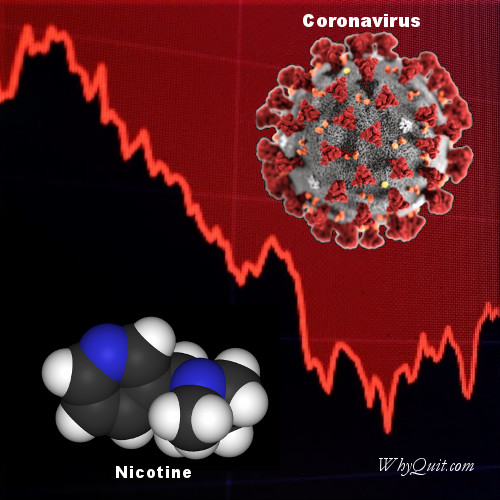
Coronavirus, stocks, nicotine not!
Why stress and worry elevate the ex-smoker's risk of relapse.
 Imagine an ex-smoker using legitimate health concerns to justify inhaling hundreds of tissue destroying toxins and scores of cancer causing chemicals, in a quest to satisfy a neuro-chemical need for nicotine that no longer exists.
Imagine an ex-smoker using legitimate health concerns to justify inhaling hundreds of tissue destroying toxins and scores of cancer causing chemicals, in a quest to satisfy a neuro-chemical need for nicotine that no longer exists.
As permanent as alcoholism, just one puff and up to 50% of brain dopamine pathway receptors become occupied by nicotine.
Permanently primed and grooved for relapse, a comfortably recovered ex-smoker may only need a single puff to fully awaken what was a fully arrested addiction. Sadly, the addict is back.
Imagine using legitimate concerns over the free-falling value of your 401(k) retirement account to relapse to smoking, creating a substantial likelihood that slow suicide via smoke toxins will kill you before you reach full-retirement age.
A 2013 study found that more a million ex-smokers relapsed to smoking following the 9-11 World Trade Center terrorist attacks. But why?
It’s natural and normal for ex-smokers to believe that nicotine is a stress-buster, that it calmed them during crisis. How could they not? They’d felt it happen hundreds or maybe even thousands of times previously. Or, did they?
Stress relief is possibly the most deeply engrained smoking belief of all. And this false belief certainly isn't news to the nicotine addiction industry.
According to a once secret 1983 Brown & Williamson research memo, "People smoke to maintain nicotine levels" and "stress robs the body of nicotine, implying a smoker smokes more in times of stress due to withdrawal, not to relax."
Said differently, stress accelerates withdrawal's onset. Sadly, a million 9/11 ex-smokers fell prey to the influence of durable wanting satisfaction memories created by an actively feeding nicotine addict in need of more.
Although by different means, stress and alcohol cause urine to turn more acidic. As if attempting to protect the bladder from over-acidification, the kidneys accelerate removal of acid-neutralizing alkaloids from the bloodstream, including nicotine. While still smoking, this added the onset of early withdrawal atop stressful situations, forcing an immediate need for nicotine replenishment.
Then and there, within seconds of inhaling a new supply of nicotine, a durable yet false association memory was created suggesting that smoking satisfies stress.
But the underlying stressful event hadn’t changed. If a loved one was ill or dying, they were still ill or dying. If a bill was unpaid, it was still unpaid. If a relationship was fractured, it still needed mending.
While the ex-smoker’s brain contains countless memories of feeling less stressed after smoking – instilling a deep belief that nicotine is an emotional solution to crisis – what those memories reflect is an addict in need satisfying that need.
My mentor Joel Spitzer uses the example of a never-smoker and a smoker both experiencing flat tires while driving in freezing rain. They stop, get out and look at the flat. The never-smoker sighs and then immediately reaches for a jack to begin changing the tire. And the smoker reaches for ....? That's right, a cigarette.
Stress, anger, worry and fear cause release of hormones which quickly turn urine more acidic. The problem is that the speed or rate by which the kidneys remove and eliminate the alkaloid nicotine from the bloodstream is directly tied to urine acidity (Schachter 1977).
The more stressful the event, the more stress hormones released, the more acidic our urine, and the quicker we sensed withdrawal's onset.
In one study, an increase in urine acidity from a pH of 5.6 to a pH of 4.5 (making it 11 times more acidic) caused a 206% increase in the rate by which the kidneys eliminated nicotine from the bloodstream.
The further from our last nicotine replenishment when stress occurred, the more noticeable and sooner stress induced wanting was felt.
The bottom line, the ex-smoker's brain long, long ago fully adjusted to functioning during crisis without nicotine. But just one puff of nicotine and they may soon find their brain wanting, plotting to obtain or even begging for more.
Don’t let worries over health or money deprive you of your health, life and retirement. You’re far smarter than that. And be sure to share this lesson with every ex-smoking friend.
There was always only one rule: no nicotine today, to never take another puff.
Related Stress Reading and Videos
New Reactions to Anger as an Ex-smoker
"Use relieves stress and anxiety"
Resources regarding interaction between nicotine and stress

